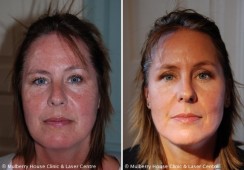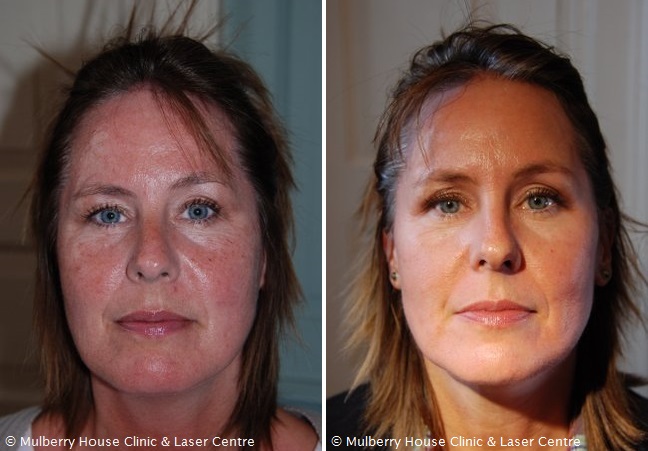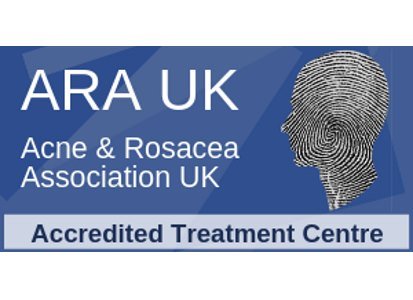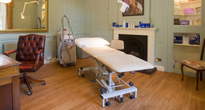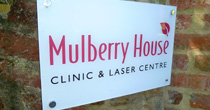Rosacea is a chronic inflammatory skin condition which affects around 1 in 20 or 5% of the population in the UK and Europe.
It can cause a variety of problems for sufferers, including:
- Redness and flushing: The most common symptom. Flushing can be triggered by a variety of factors, including heat, sunlight, alcohol, spicy foods, and stress.
- Pimples: Small, red bumps that may be filled with pus. These pimples are often mistaken for acne, but they are different in that they are caused by inflammation rather than bacteria.
- Skin thickening: This can make the skin look red and bumpy. It can also make it more difficult to apply makeup.
- Eye problems: Symptoms such as burning, stinging and watering. The eyes can also become bloodshot and swollen.
- Pain and itchiness: Some people with rosacea may experience discomfort and itching.
Who is most likely to have rosacea?
The exact cause of rosacea is unknown, but it is thought to be caused by a combination of factors, including genetics, environmental triggers, and the immune system.
- Most common in adults between the ages of 30 and 50
- More common in women than in men
- Higher in Western countries and those of Northern European descent than in people of African or Asian descent
There is no cure for rosacea, but there are treatments that can help to manage the symptoms. These treatments include topical medications, oral medications, and laser therapy.
However, it is also important to try and understand what external factors could be triggering rosacea. Common triggers include heat, sunlight, alcohol, spicy foods, and stress. Harsh skincare products can also irritate the skin and make rosacea worse, so it’s best to choose gentle skin preparations and regimes.
Find out more about rosacea.
Lifestyle changes
Depending on the triggers, some of the intensity of symptoms can be managed through simple lifestyle changes:
- Good skincare – gentle cleanser and moisturiser
- Good hygiene – including eye bathing or drops if the eyes are affected
- Daily use of sunscreen – mineral sunscreens may be preferable as they can be less irritating to the skin
- Avoid extreme hot or cold temperatures
Rosacea treatment options
At Mulberry House Clinic, there are a number of medical treatment options for rosacea. We’ve seen good results with in-clinic treatments such as IPL treatment and LED treatment. Microneedling can also be considered, as the use of tiny needles to create tiny holes in the skin can help to improve the appearance of the skin by stimulating collagen production. Microneedling is often used in combination with other treatments for rosacea.
In addition, at-home cosmeceutical skin care regimes designed to deal with rosacea have been effective in reducing the redness/flushing and promoting a healthier tone and appearance to the skin. Prescription Skincare incorporates active ingredients to help. The benefits could be antibiotic, anti-inflammatory, anti-parasitic, vasoconstriction, antimicrobial, retinoids and T-cell inhibitors. There is good clinical evidence demonstrating the value of appropriate daily skincare and we’ve seen excellent results with ZO Skin Health for our rosacea patients.
For best results, a combined approach is often best, where at-home skincare is supported by in-clinic energy-based treatments.
Before and after photos
Rosacea treatment at Mulberry House Clinic
Acne and Rosacea Association UK (ARA UK)
Mulberry House Clinic is the ONLY Accredited Treatment Centre of the Acne and Rosacea Association UK (ARA UK) within a 10 mile radius of Northampton.
To achieve the accreditation, Dr John Tanqueray completed additional specialist training in Acne and Rosacea.
Patients with rosacea can have confidence that they’ll find high standards of knowledge about the condition, an accurate diagnosis and a range of suitable treatment options.
Mulberry House Clinic
Established 2003
Mulberry House Clinic has an excellent reputation in the Northampton area as an independent, doctor-led practice with over 20 years experience. Dr John Tanqueray is a former GP who can assess and diagnose skin conditions from a medical perspective before suggesting the most appropriate skin treatments. The offering includes top brand injectables and advanced technology that would rival that found in most Harley Street clinics.
A private consultation is the starting point for all patients in order to facilitate a full discussion about the desired results as well as detailed facial and skin assessment. Find out more about first consultation.
For further information or to arrange a confidential consultation, please complete our contact form, call 01604 702630 or email: info@mulberryhouseclinic.co.uk.
